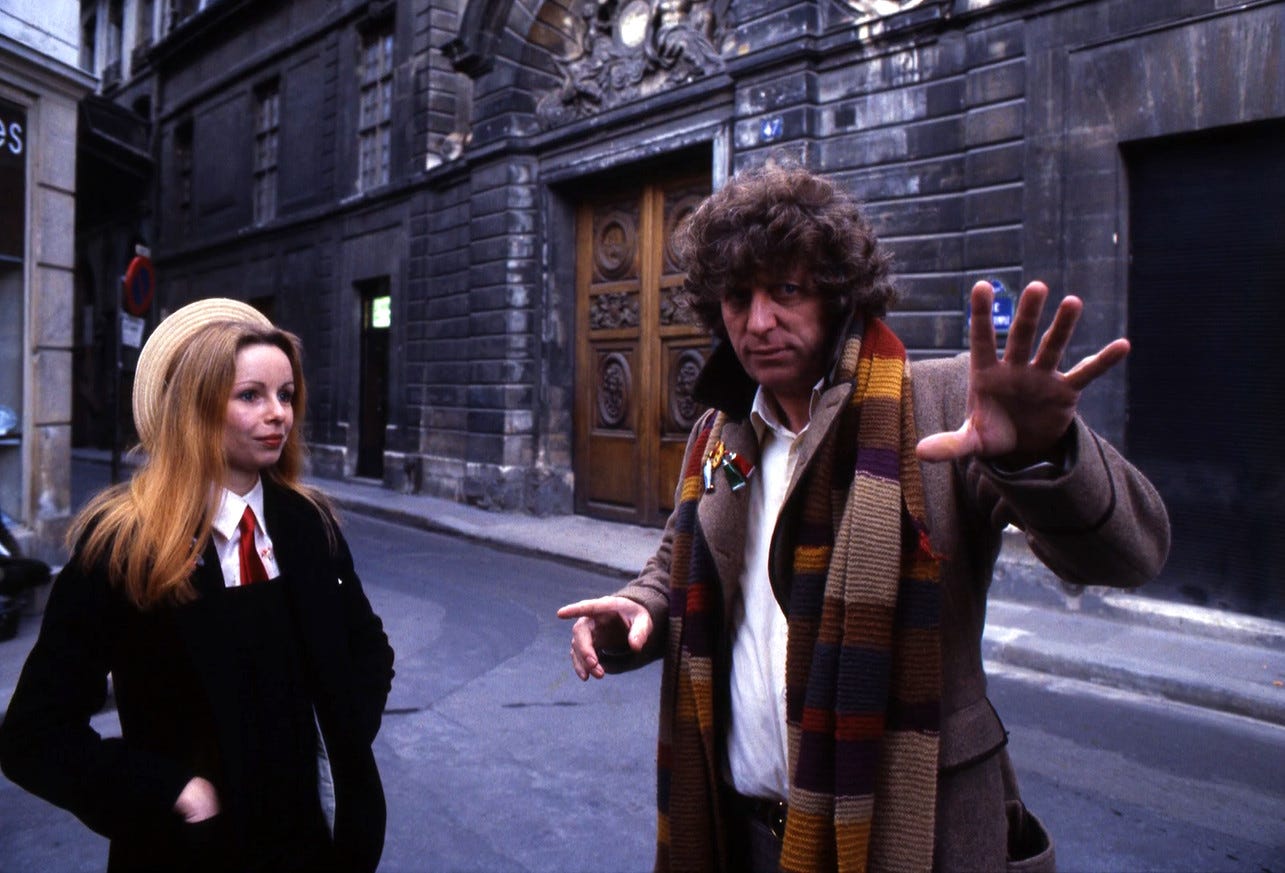I’m fascinated by names and titles; I love to know why places or, more particularly, works of literature, got their names and what those names say to us. This fascination is particularly strong regards Doctor Who story and episode tiles. I am embarking on an occasional series of short(ish) posts examining the titles of Doctor Who stories to try to understand how they work, what they mean or why they were used. First up: City of Death.
Fan wags have sometimes said that, while City of Death does indeed feature a city and some death, the title is meaninglessly generic. The DVD extra Paris in the Springtime even said that the story “needed a dramatic, evocative title. Unfortunately, it got City of Death instead.” They’re all wrong. The title is evocative and dramatic but also relevant, playful and witty as you might expect of Douglas Adams. This becomes apparent when you consider exactly which city it references. The criticism of the fan wags would be fair if the story involved any other city but Paris.
Let’s start with a bit of history. Not of Paris (that will follow) but of the story’s conception. It’s well-know that it started life as a David Fisher story called ‘The Gamble with Time’ that involved a Monte Carlo casino. In fact, it opened in Paris before continuing in Monte Carlo in part two. Producer Graham Williams was concerned about certain aspects of the story, including the gambling plotline. He also learned that it would be possible to shoot locations sequences in Paris. These factors led to the story being rewritten to eliminate the casino and the Monte Carlo setting, with almost the entirely of the action now taking place in Paris. This was the key decision which would lead to the title City of Death.
The resulting story was credited to the pseudonym ‘David Agnew’ to disguise the fact that it had been largely written by script editor Douglas Adams, albeit using parts of Fisher’s original, as Fisher was unable to perform the extensive rewrite. In Fisher’s original version, the ‘Gamble with Time’ title held a slight double meaning, referring to Scarlioni’s time experiments and reflecting the casino gambling element. With the latter excised it was a less suitable title, and Williams may already have been uneasy about it given the gambling reference. The title couldn’t stand.
It’s surprising therefore to find ‘The Gamble with Time’ got as far as the rehearsal script which the cast would have used between the Paris filming and the studio recording sessions. Some sources report that other working titles used were ‘The Curse of Sephiroth’ and ‘The Time of the Sephiroth’ (Sephiroth being the original name of the Jagaroth) but these aren’t reflected in the production file itself.
The final title appears to have been agreed late in the day, first appearing in writing in a memo dated 8 May 1979, a few days after location filming concluded and not quite two weeks before studio recording commenced. It’s speculation only but it’s tempting to think that the successful completion of the Paris filming prompted the production team to reflect the location in the title. City of Death is certainly a better title than any of those early ones noted above. Before I explain why, please excuse a brief diversion to consider Douglas Adams’s other Doctor Who story titles.
The Pirate Planet contains a sort-of misdirection or double meaning. It allows the audience to envisage a planet of pirates, or one controlled by pirates, which the narrative itself initially seems to present, and that works as one reading of the title. But as we come to learn, the planet Zanak itself is a pirate (well sort of), engulfing and consuming other worlds. “Zanak, the pirate planet…” says the Doctor. The title is more literally true than it first appeared; the story’s twist hidden in plain sight, right at the start. I think that’s rather clever.
We can’t say there’s anything clever about Shada’s dull label of a title, but the Pirate Planet example shows us that Adams could deploy a double-edged title when he chose. He did it again for City of Death. We don’t know for sure that it was he who renamed the story, a decision that would be surely have to be agreed between him and Williams, but I’d wager (sorry Graham) that it was Adams’s idea as it uses similar wordplay to The Pirate Planet.
Paris has been known as the ‘City of Light’ since the eighteenth century, possibly even longer, in reference either to its role in the Enlightenment or, more prosaically, to its early adoption of streetlighting. Maybe both. But it’s also known as the ‘City of Love’, in reference to its role in many literary love stories (as the tourist information claims), or because of its nineteenth century reputation for offering easy access to more carnal pleasures (as the historians tell us). Maybe both.
But the origins of these names don’t matter. The point is Paris is well-known by nicknames naming it the City of Light or the City of Love. So why call the story in question City of Death?
The title is an ironic reference to one or other (maybe both) of those nicknames. Doctor Who titles typically had an evocative, ominous note to them, with at least one word promising something deadly or otherworldly. City of Death is a macabre play on City of Light/Love. ‘Death’ is not quite an antonym of ‘Light’ or ‘Love’ but it’s not far from it, and is certainly close enough that City of Death works as a sinister inversion of those nicknames.
I suspect it was City of Love that was in Adams’s mind. Adams spoke French and would have known that in French this was ville d'amour. ‘Of Death’ would be de mort. With the ‘t’ of ‘mort’ being silent, ‘amour’ and ‘mort’ sound very similar in French pronunciation. This may have inspired Adams to choose City of Death as both an inversion and a near-homophone in French of City of Love. Thanks to James Cooray Smith for pointing that out.
The title City of Death isn’t generic at all. It wittily but obliquely reflects the story’s location while adhering to the template of emotive titles. I think that’s rather clever too.
Images © BBC
Sources
Production paperwork and other VAM on the Doctor Who Season 17 bluray set
Doctor Who: The Complete History, volume 31 (2018)







It’s also a pun, but only in French.
ville d'amour = city of love
ville de mort = city of death